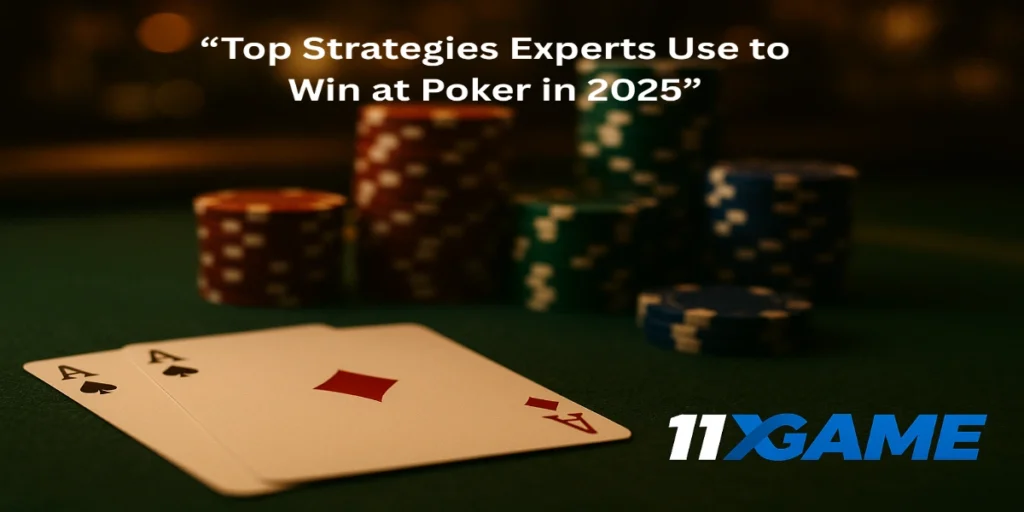Top Strategies Experts Use to Win at Poker in 2025
Poker is one of the most popular and intellectually demanding casino games in the world. Unlike many games of chance, poker combines skill, strategy, and psychology, giving expert players an edge over casual gamblers. Whether you play Texas Hold’em, Omaha, or other variants, understanding the nuances of the game is critical to long-term success.
In this article, we’ll explore top strategies experts use to win at poker in 2025, including bankroll management, game-specific tactics, psychological approaches, and responsible gambling practices.
1. Understanding Poker Fundamentals
Before diving into advanced strategies, it’s crucial to master the fundamentals:
- Hand rankings: Knowing which hands beat others is the foundation of poker strategy. High pairs, straights, flushes, and full houses have different probabilities that influence betting decisions.
- Pot odds: Calculating pot odds allows players to determine whether a call is profitable in the long run.
- Probability: Understanding the likelihood of drawing certain hands or completing a flush/straight helps guide decisions.

Experts emphasize that mastery of these basics is non-negotiable. Without understanding the math behind poker, even skilled psychological strategies may fail.
2. Bankroll Management: Controlling Your Money
Effective bankroll management separates successful poker players from amateurs:
- Set a dedicated bankroll: Only use money you can afford to lose.
- Bet sizing: Experts often use a small percentage of their bankroll per game or tournament to reduce risk.
- Avoid chasing losses: Increasing bets after losing hands often leads to bigger losses.
- Tracking results: Maintain a detailed record of wins, losses, and ROI to evaluate performance.
By managing bankroll responsibly, players can endure variance while remaining in the game long enough to leverage their skill.
3. The Importance of Table Position
Position at the table is a critical factor in poker strategy:
- Early position: Players act first and have less information about others’ decisions. Conservative play is recommended here.
- Middle position: Offers more information and opportunities to play a wider range of hands.
- Late position (dealer/button): Most advantageous, as you act last and have maximum information about opponents’ moves.
Experts adjust their betting and hand selection based on table position to maximize value and minimize risk.
4. Reading Opponents and Psychology
Poker is often described as a game of people, not just cards. Understanding opponents’ behavior is key:
- Bluffing: Experts use bluffing strategically to force opponents to fold better hands.
- Tells: Physical or behavioral cues can indicate hand strength in live poker.
- Patterns: Observing betting patterns over multiple hands helps anticipate opponents’ moves.
- Emotional control: Remaining calm and avoiding “tilt” prevents emotional decisions that can cost money.
Psychological mastery often distinguishes expert players from casual gamblers.
5. Game-Specific Strategies
Different poker variants require tailored approaches:
a) Texas Hold’em
- Starting hands: Experts selectively play premium hands in early position and widen their range in late position.
- Aggression: Strategic aggression (raising and re-raising) can build pots and pressure opponents.
- Continuation bets: Experts often follow up pre-flop raises with post-flop bets to maintain pressure.
b) Omaha
- Pot control: With more starting cards, pots can grow quickly. Experts control bet sizes strategically.
- Drawing hands: Omaha emphasizes strong draws; knowing the probability of completing a flush or straight is essential.
c) Tournament Play
- Chip management: Experts adjust play based on stack size relative to blinds and opponents.
- Risk assessment: In tournaments, survival is often more important than aggressive accumulation early on.
6. Using Data and Statistics
Data-driven analysis is increasingly important in poker:
- Hand history tracking: Software can analyze tendencies and improve decision-making.
- Statistical profiling: Identifying opponents’ patterns, like frequency of raises or bluffs, helps tailor strategy.
- Expected value (EV): Calculating EV ensures that every decision is profitable over time.
Experts combine data analysis with psychological insight for maximum advantage.
7. Avoiding Common Mistakes
Even experienced players can make mistakes, but experts avoid these common pitfalls:
- Chasing losses: Increasing stakes after losses rarely recovers money effectively.
- Playing too many hands: Overplaying weak hands reduces expected value.
- Ignoring position: Acting without considering table position often leads to poor outcomes.
- Emotional play: Allowing frustration or overconfidence to guide decisions leads to mistakes.
Recognizing these mistakes early can dramatically improve long-term performance.
8. Bluffing and Deception
Bluffing is a critical tool in poker but must be strategic and situational:
- Frequency: Over-bluffing reduces credibility; under-bluffing reduces potential profit.
- Opponent analysis: Bluffing is most effective against cautious players and less effective against “calling stations” who rarely fold.
- Context: Timing, board texture, and stack size all influence bluffing success.
Experts blend mathematical analysis with strategic deception for consistent results.
9. Bankroll and Risk Management in High-Stakes Games
For high-stakes players, bankroll management is even more crucial:
- Diversification: Avoid putting the majority of bankroll in a single session or tournament.
- Stop-loss limits: Set maximum loss thresholds per session to prevent catastrophic losses.
- Risk-adjusted aggression: Increase risk only when odds are favorable or opponents are weak.
This discipline allows experts to sustain long-term profitability even in high-variance situations.
10. Responsible Poker Practices
Even for experts, responsible play is key:
- Mental health: Avoid stress and fatigue that impair decision-making.
- Time management: Schedule breaks and avoid marathon sessions.
- Self-awareness: Recognize when tilt or emotions affect play and step away.
- Seek help if needed: Problem gambling resources can support healthy engagement.
Responsible practices ensure poker remains both enjoyable and sustainable.
(This article is for informational purposes only. Gambling involves risk. Please bet responsibly.
Always check local laws before playing & follow the law.)
Conclusion
Winning at poker in 2025 requires a combination of skill, strategy, and psychology. Experts leverage:
- Mastery of fundamentals (hand rankings, odds, and probability)
- Effective bankroll management and risk control
- Strategic use of table position and aggression
- Psychological insight into opponents and emotional control
- Game-specific tactics for Texas Hold’em, Omaha, and tournaments
- Data-driven analysis and expected value calculations
By incorporating these strategies, players can maximize long-term success and approach poker as a calculated, skill-based game rather than relying solely on luck.
The key takeaway: poker is not just a game of cards—it is a game of decisions, discipline, and strategy. Smart, informed choices consistently outperform luck over time.
FAQ – Poker Strategies
Q1: Can beginners use expert strategies?
A: Yes. Basics like bankroll management, table position, and hand selection are accessible to all players.
Q2: How important is psychology in poker?
A: Very important. Reading opponents, bluffing effectively, and controlling emotions are key to long-term success.
Q3: Are poker odds purely luck-based?
A: No. Skill, strategy, and probability play a major role in outcomes, especially over multiple sessions.
For more educational resources and responsible gaming tips, visit 11xGame to stay informed and safe while enjoying your favorite sports.”






